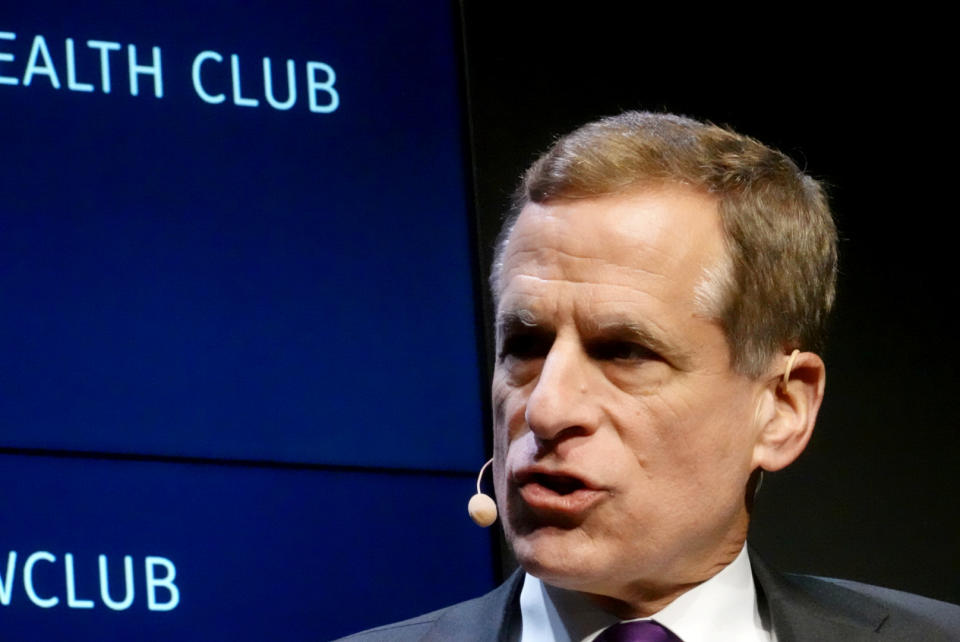Dallas Fed's Kaplan expects 'substantial number' of bankruptcies amid oil crunch
Federal Reserve Bank of Dallas President Robert Kaplan told Yahoo Finance on Wednesday that plummeting oil prices will have to result in some bankruptcies and restructurings. But he clarified that the Fed will not step in to save insolvent companies that had pre-existing credit issues.
“There are a number of companies in this industry, either drillers or service providers, that went into this highly leveraged, and I think they're going to have to pursue other actions in order to restructure their debt,” Kaplan told Yahoo Finance’s “On The Move.”
Kaplan said creditworthy companies that pass lenders’ cash flow tests will be eligible for loans through the Fed’s forthcoming Main Street Lending facility.
Last Thursday the Fed expanded the scope of the program to offer low-cost, four-year loans to larger companies with as many as 15,000 employees or up to $5 billion in annual revenue. The loans would allow companies to pay down “mandatory and due” debt.

That facility could cover energy-exposed companies like those in Kaplan’s district, many of which are feeling immense cash flow pressure as they shut down rigs amid the sharp drop in oil demand.
“There will be a substantial number of bankruptcies, restructurings that are going to have to happen, because so much of production is being shut in,” Kaplan said.
[See also: Fed’s Harker: U.S. economy could contract by 5% in 2020]
But Kaplan said highly leveraged companies will not be able to access the Main Street Lending Program. The loans would have to meet existing standards in addition to an earnings test that limits the size of the loan to four- to six- times adjusted EBITDA, depending on the type of Main Street loan taken.
In late April, prices on WTI crude oil fell below zero as a lack of storage space for unused oil left sellers with no choice but to pay counterparties to get the contracts off of their hands.
But oil prices were under pressure since March, when Saudi Arabia slashed prices after negotiations on supply fell through among OPEC nations and Russia. As WTI prices fell below $30 per barrel, the Dallas Fed in late-March reported significant declines in business activity among oil and gas companies as capital expenditures and jobs were slashed.
Economic forecast
Kaplan, a voting member of the Fed’s policy-setting Federal Open Market Committee, offered rough estimates on the U.S. economy at large and predicted a 25% to 30% annualized contraction in U.S. GDP for the second quarter.
He said the unemployment rate could get as high as 20%, ending the year closer to 8% to 10%.
Kaplan said he sees growth returning in the third and fourth quarter of 2020.
On Fed policy, Kaplan said the central bank will have to “run a very accommodative monetary policy for some extended period of time.”
[See also: Fed’s Barkin: Unemployment could soar to high teens]
Last Wednesday, the central bank committed to keeping interest rates at near-zero until policymakers are “confident that the economy has weathered recent events.”
Fed Chairman Jerome Powell reiterated that the Fed would move “forcefully, proactively, and aggressively” to bridge the economy through the coronavirus-induced business stoppages across the country.
In addition to near-zero interest rates and cap-less quantitative easing, the Fed has opened up nine liquidity facilities to backstop markets ranging from municipal debt to risky corporate bonds.
Kaplan was hesitant to comment on the fiscal measures on Capitol Hill, but said policymakers could probably do more.
“Fiscal policy in the form of grants, either to individuals or state and local governments or other entities, are going to be necessary,” Kaplan said.
As the Fed focuses on its monetary policy actions, Kaplan added that the central bank has sidelined its review of its monetary policy framework, which sought to tweak its approach to its inflation-targeting strategy, among other things.
The Fed’s next scheduled policy meeting will take place June 9 and 10.
Brian Cheung is a reporter covering the Fed, economics, and banking for Yahoo Finance. You can follow him on Twitter @bcheungz.
Buffett: FDIC would have made Great Depression a 'much different experience'
Hotels eye Fed’s Main Street loans as occupancy rates remain low
El-Erian: Fed is tangled in a 'spaghetti bowl' of credit risk
A glossary of the Federal Reserve's full arsenal of 'bazookas'
Read the latest financial and business news from Yahoo Finance
Follow Yahoo Finance on Twitter, Facebook, Instagram, Flipboard, SmartNews, LinkedIn, YouTube, and reddit.
